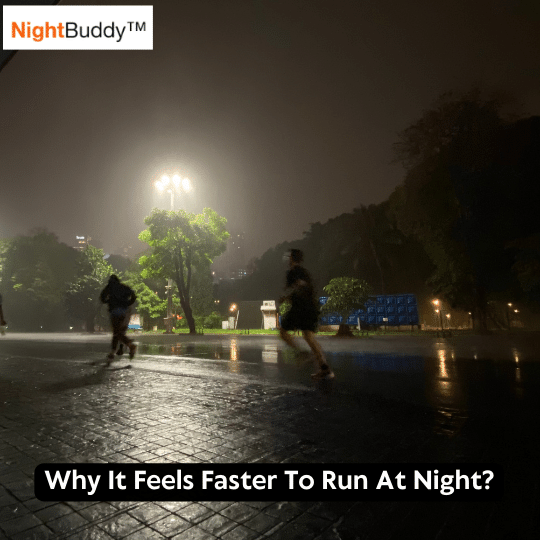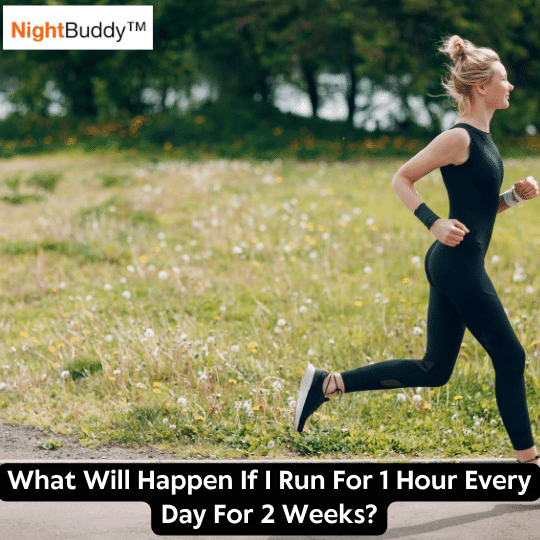Why Running at Night Feels Faster: Exploring the Science Behind Perception
Have you ever experienced the sensation of running faster when it's nighttime? You're not alone!
Many runners report that their nighttime runs feel faster than during the day, even when their pace remains the same.
Why?
Several factors contribute to this unique phenomenon, making for an interesting exploration into the relationship between the human body, perception, and the natural environment.
Also see our guide on why some runners feel it's harder to run at night!
Firstly, the reduced visibility at night alters your perception of speed. In the darkness, it becomes more challenging to visually track objects, causing the surroundings to blur as you run... This creates an illusion of moving at a faster pace. Additionally, with less light, it's harder to gauge distances accurately, contributing to your perception of covering ground more rapidly.
Secondly, running at night can be accompanied by heightened senses. As your body adapts to the darkness, your senses may become more fine-tuned to compensate for the reduced visibility.
The increased sensory awareness can make the run feel more exhilarating, leading you to perceive it as faster and more exciting. So lace up your shoes, grab a headlamp, and embrace the thrill and unique benefits of nighttime running.
The True Perception of Speed at Night

Limited Visibility
When you run at night, the limited visibility can affect your perception of speed. In low light conditions, your eyes struggle to process visual cues as quickly as during the day, making it seem like you're running faster.
Here's the thing...
Your brain might be interpreting your surroundings as passing by more quickly, giving you the sense that you've accelerated.
Reduced Distractions
Running at night also offers fewer distractions than daytime running. With fewer people and vehicles around, you can focus more on your pace... Also, the quiet and calm environment can enhance your concentration, making you feel more in-tune with your running rhythm.
This heightened awareness can give you the impression of moving at a faster pace, lightning speeds your way!
Familiarity with Routes
If you typically run the same routes during the day, you might have a greater sense of familiarity with them.
Running those routes at night can provide a different experience, as your perception of distance and landmarks may change in the dark.
This new perspective might make your usual route feel shorter and faster, leading to the impression that you're running at a quicker pace.
Physiological Factors You Need To Know About Night Running

Body Temperature and Performance
Running at night might feel faster because your body temperature generally decreases in the evening, which can improve performance. Lower body temperature helps to reduce perceived exertion, allowing you to run more efficiently:
- Cooler temperatures mean reduced muscle fatigue, as your muscles can work more efficiently.
- Sweat rates decrease in colder conditions, which helps maintain proper hydration levels.
If you're running in a warmer environment during the day, your body works harder to stay cool, resulting in an increased exertion level. When running at night, you may feel less fatigued and more capable of achieving higher speeds.
Circadian Rhythm and Alertness
Your body's internal clock, or circadian rhythm, also plays a role in how fast you perceive your nighttime runs. Alertness levels can vary throughout the day, and these fluctuations impact running performance:
- High alertness levels lead to improved reaction times and better running technique.
- Low alertness levels can result in slower reaction times and less efficient performance.
Circadian rhythm affects alertness differently for each individual. Some people/runners may feel more alert and energized at night, which can make running feel faster compared to daytime runs.
Also..
Pay attention to your natural energy patterns and consider planning your runs around the times when you're most alert!
Psychological Factors
Increased Adrenaline
When you run at night, your body's natural response to the darkness and potential risks can stimulate your adrenal glands.
This causes them to release adrenaline, providing you with extra energy to power through your run. As a result, you may feel like you're running faster than during the day.
Additionally, the lack of visual cues in low light conditions forces your body to rely more on proprioception, which is your sense of body position in space.
This heightened awareness of your body movements can give the sensation of increased speed as well.
Wait till that energy drink and music in the earphones kicks in!
Sense of Adventure
Running at night offers a sense of adventure that you may not experience during the day. The darkness and quiet environment can make you feel like you're exploring the unknown, which can be both exciting and slightly scary.
This sense of adventure can increase your focus and motivation to push yourself harder during your run, leading to a perception of increased speed.
The combination of an adrenaline surge and the thrill of the unknown contributes to the elevated sensation of speed when running at night.
Remember to prioritize your safety while enjoying the excitement and challenge that nighttime running offers.
Safety Considerations
Proper Gear
Wearing the appropriate gear is essential for your safety when running at night. Choose clothing with reflective materials, which will make you more visible to drivers and other pedestrians. In addition, consider using a headlamp or carrying a flashlight to help illuminate your path and make yourself more noticeable.
- Reflective clothing: vests, jackets, and shorts with reflective material
- Light sources: headlamps or handheld flashlights
- Footwear: well-fitting running shoes with good traction
Choosing Safe Routes
Selecting the right route can significantly increase your safety when running at night. Stick to well-lit areas and avoid poorly lit or desolate places. Familiarize yourself with the route during the daytime, so you know what to expect in terms of terrain and potential hazards. Additionally, it's essential to vary your routes to avoid predictability.
- Well-lit areas: streets with lampposts, illuminated parks, or areas with street lights
- Familiar routes: knowing the terrain and potential obstacles is crucial
- Vary your routes: change your running route often to avoid predictability
Remember, being mindful of these safety considerations when running at night will not only enhance your experience but also help you enjoy the benefits of nighttime running with minimal risk.
Final Thoughts
In summary, running at night feels faster due to several reasons.
As you navigate through dimly lit environments, your senses function differently, allowing you to perceive speed with heightened awareness.
This heightened awareness, coupled with external factors such as less visual stimuli and temperature changes, contributes to the sensation of running faster in the dark.
Running at night also influences your psychological state. Your adrenaline and cortisol levels may increase, further accentuating the feeling of increased speed.
Although these sensations may be beneficial for boosting motivation and performance, it's important to prioritize your safety and run in well-lit areas whenever possible.
The phenomenon of running at night feeling faster is a fascinating aspect of human perception worth exploring.
By understanding the factors contributing to this sensation, you can optimize your nighttime running experience for both performance and enjoyment, while staying aware of potential risks.
Happy running from the Night Buddy team!
Also check out night running for torching fat..





Leave a comment
This site is protected by hCaptcha and the hCaptcha Privacy Policy and Terms of Service apply.